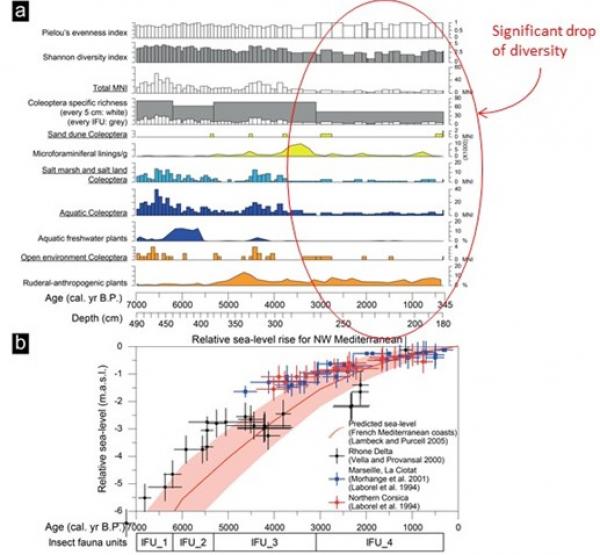Frédéric Guibal, Frédéric Guiter, Frédéric Médail, Philippe Ponel, Yoann Poher (IMBE)
Kazuyo Tachikawa, Marta Garcia, (CEREGE)
The collaborative program CoP²A, “Corsican Palaeoclimate, Palaeoenvironments and Anthropization” aims at reconstructing and evaluating past interactions between continental ecosystems, climate variability and land-use in Corsica for the last 15 millennia. The issue of this program has been defined around the following paradox: Corsica is the sole island still characterized by diversity of old and mature forests (with 29 % of forested area) in spite of:
- A long history of human occupation (since the Mesolithic) with strong man pressure (agropastoralism, fires)
- A high vulnerability of habitats due to the insularity
- An overall Mediterranean hydrological deficit (promoting fires)
Therefore, compared to landscapes in Malta, Cyprus, Sardinia and even in the northern part of Mediterranean area, Corsican ecosystems are particularly well-preserved.
The goal of CoP²A program is to document past dynamics of forests and woodlands and to reconstruct holocene climate variability and human impact in Corsica by analyzing two series of palaeoenvironmental archives:
- lacustrine and palustrine records,
- long tree-ring series sampled in old populations of Pinus nigra sbsp. laricio, Fagus silvatica and Quercus pubescens.
Among the 4 sites studied in the framework of the COPPA program, the 7000-year sedimentary record of Cavallo provided Coleoptera and plant species abundance data which allowed reconstructing effects of past global sea-level rise on Mediterranean coastal wetlands through past Coleoptera and plant dynamics. Our results show that wetland beetle species diversity and richness decreased significantly when the wetland salinity increased as the relative sea-level rose above -1.5 ± 0.3 meters, with a peak diversity loss occurring 3700 years ago. Moreover, inland freshwater bodies appear to be key refuge habitats for the persistence of biodiversity on low Mediterranean islands threatened by global sea-level rise.
* MNI = Minimum Number of Individuals



